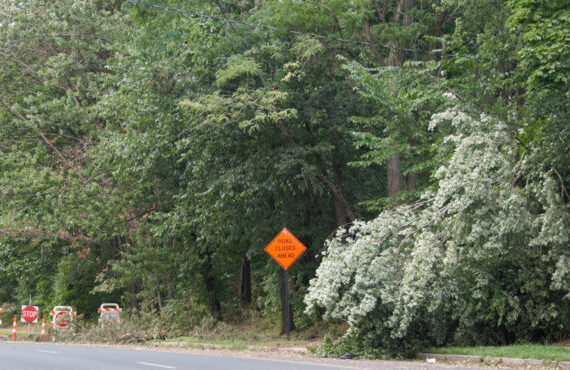Eighteen people, ranging from traditional college students to retirees, gathered in a musty basement bordering the Trinity College campus, yet not one was currently affiliated with this institution. Reaching them required navigating around the bicycles; bikes were tied to the chain link fence, to other bikes, to the porch, or just leaning against the narrow hallway walls inside.
Five young adults from New England Climate Summer were meeting with community members during their week-long stop in Hartford. They are one team of six taking part in this action and are cycling across New England specifically to speak with local activists in various towns and cities so that these individuals and organizations are acknowledged.
The Connecticut/Rhode Island team — an all female team — began in Providence (RI) before coming to Hartford. Next, they will make stops in Bridgeport, North Kingstown (RI), Westerly (RI), Stonington, Mystic,New Haven, and will end their trip in Roxbury/Boston (MA). The majority of all New England Climate Summer participants, actually, are women.
After Thursday evening’s potluck meeting, attended by folks affiliated with CCEJ and The Summer of Solutions, and others, I spoke with women from the Climate Summer Connecticut/Rhode Island team about their adventure so far. To set out on such a trip, one would expect the cyclists to have raced or at least trained for it. Instead, they said:
No one in the group has [done] anything like this before. In fact, most of us weren’t even avid cyclists before the trip. We’re learning as we go, and I think a lot of us will definitely be inspired to bike much more now that we’ve had this experience. Now that we’ve done a couple of 50+ mile days, biking one or two miles to the store won’t seem like a big deal.

This might not seem like a lifestyle change to some, but 40% of trips people in urban areas take are within two miles of home, yet 90% of those trips are made using an automobile. In an age when peak oil is no longer something that may possibly happen in a few generations’ time, it’s hopeful that there are young people taking energy issues seriously.
While they report a few minor snags, like potholes, debris in the road, and the lack of shoulders, they say that generally, their experience has been “very positive”:
Avoiding using automobiles for the summer is much more doable than people might initially think.
The Climate Summer group says they have “most enjoyed having the opportunity to meet and have fascinating conversations with so many different people. There is so much that we’ve learned just through casual interactions.”
Instead of sitting in a classroom or being engaged only in armchair activism, Climate Summer moves through communities. So far, they say that they have “learned that there are many different people and organizations all working in some way or another towards the same goal of sustainability and that there are many different ways to attack the issue of fossil fuel burning, some of which we hadn’t even thought of before.”
Specifically, during their stop in Hartford, they say they’ve:
met, formed connections with, and learned about several different groups, including Neighbor to Neighbor (an energy efficiency program), Connecticut Coalition for Environmental Justice, Clean Water Fund, Bike Walk Connecticut, the Billings Forge Farmer’s Market, and Summer of Solutions (a group of college students working on starting a community garden with the Somali-Bantu refugee community in Frog Hollow). We’ve learned a lot and have been inspired to see all that is going on in the city.
Their experience has not been positive only in Hartford. Throughout their trip, the team of Julia, Tara, Ellie, Jacqueline, and Louisa, have found “that most people are very positive and eager to help out and learn more about the movement.”
This action is not over at the end of summer. They say that when the trip is complete, they “will put together a State of the Movement Report that will document all of the organizations and efforts that we and the other five teams have learned about in our travels.“
“We hope to maintain the connections that we have made,” they say, “and hope that the report will serve as an inspiration and resource for people all over who are looking to get more involved with the movement.”
Beyond this, they report “looking forward” to September 24th, “a day on which we are encouraging people to ‘move’ to Boston via some sort of alternative transportation (walking, biking, public transportation) to illustrate that we can avoid using fossil fuels and to symbolize that we need movement from our legislators on this issue.”
Climate Summer is part of the Better Future Project. Their next stop is Bridgeport, CT.

Rich
Other than the Daily Rider blog post about them at the Farmers’ Market, I wouldn’t have known this group was going to be in Hartford at all; I didn’t see any publicity, and it’s hard enough just to run into people I do know randomly. I guess there was no real schedule for them other than to “be in town for a few days.”
Anyway, pretty cool way to spend a summer. I see a couple of them have ties to my home region: Watkins Glen and Elmira, NY. Good luck to them.
How does the anti-fracking picture tie into their visit to Hartford?
Kerri Provost
The photo only relates in the very general “this has to do with energy” way. I linked to the Daily Rider post because he had a photo of the group.
I mentioned the lack of publicity to them; I only became aware of them when someone mentioned to me that there was a potluck and bikes were involved.
Chris Hall
Well, it looks like an annual summer program, so now we know to keep an eye out for next year?? In any event, now I know the names of six or seven environmental groups in the Hartford area thanks to this story…